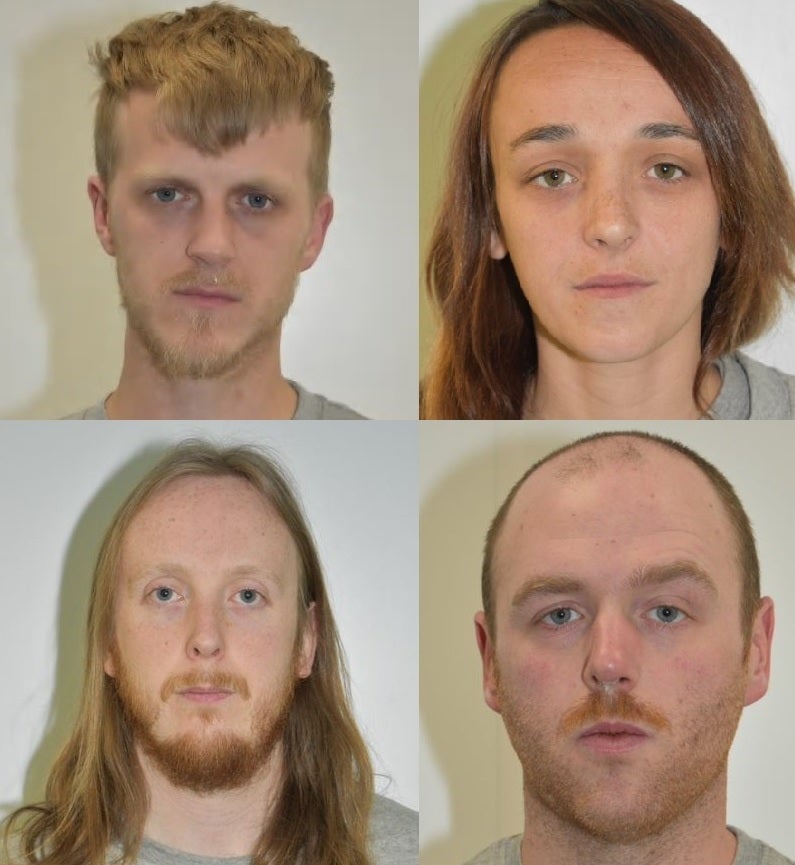‘Fascist cell’ convicted of terror and firearm offences after trying to make 3D-printed gun
Two of the defendants were members of an online group where terror manuals and weapons guides were shared among neo-Nazis

Members of a “fascist cell” have been convicted of terror and firearms offences after police discovered they were trying to manufacture 3D-printed guns.
Samuel Whibley, 29, Daniel Wright, 29, Liam Hall, 31, and his girlfriend Stacey Salmon, 29, were convicted of a total of 15 offences on Thursday.
A trial at Sheffield Crown Court heard that in the home Hall and Salmon shared with their children, officers found an improvised explosive device, homemade explosive substances, chemicals and parts of a 3D-printed handgun.
The unfinished “improvised firearm” found in the kitchen was found to have Hall, Salmon and Wright’s DNA on it.
The trio lived in Keighley, while Whibley is from Anglesey in Wales and had not met them in person, the court heard.
He had set up a neo-Nazi channel on the encrypted Telegram app, and linked private chat, which Wright joined.
Prosecutor Annabel Darlow QC said the channel and chat “encouraged readers to take violent action”.
“It wasn’t about academic interest or theorising, this was about finding the ways and means to copy those responsible for the worst extreme right wing atrocities,” she told jurors.
“These four defendants were members of an extreme fascist and terroristic cell during the first four months of 2021. They embraced extreme right-wing propaganda and celebrated racist violence and killing.”
Whibley had set up a public Telegram channel called Oaken Hearth, which he called a “gathering place for British white nationalists”, and linked private chat.
The court heard that he vetted people prior to admission into the chat, demanding they prove they were white with a photo, and answered a series of questions about their age, history of involvement in neo-Nazi movements and “prepping” for societal breakdown.
Wright, who was close friends with Hall and Salmon, joined the chat and communicated directly with Whibley under the username “Gott Mit Uns”, which was displayed on the belts of Nazi soldiers in the Second World War.
Ms Darlow told jurors: “Despite it being apparent that certain users of the chat were children, this in no way deterred those involved from the process of radicalisation and the repeated provision of detailed information on matters including the manufacture of homemade firearms.”

Other themes including racial violence, the jury was told, and evidence to the jury showed all four defendants sharing anti-black and antisemitic videos, memes and images, as well as material glorifying Adolf Hitler and the Nazis.
The court heard that Whibley praised the Christchurch shooter Brenton Tarrant, Norway terrorist Anders Breivik and Oklahoma bomber Timothy McVeigh as “once in a generation individuals”.
“We cannot all commit to this,” read a post he shared on Telegram. “For the time being, I believe those who are capable of action should work together.
“No more lone wolf ‘take a few with me’ s***, as much as we love it isn’t good enough. Work in teams and cause utter mayhem when you strike.”
A spokesperson for Counter Terrorism Policing Northeast said that unknown to the defendants, an undercover officer infiltrated the Telegram chat and “established himself as a trusted contact within private messages” to monitor their activities.
The defendants had denied all charges. Whibley denied advocating for a race war, but said it was one of the “possible scenarios” he envisaged in his doomsday preparation activities.
When giving evidence during the trial, he said he had been an army cadet as a teenager and had an interest in the history of the Second World War.
Whibley denied being a neo-Nazi or fascist, and described himself as a “right-leaning libertarian” who believes in “minimal government”.
Salmon, who has four children with Hall, said she had come across information on the internet accusing Jews of controlling the media and banks, and watched neo-Nazi videos while “trying to see both sides of the argument” about Hitler.
Hall said he was not preparing for terror attacks and “couldn’t even kill a cockerel”, and that explosives substances found in the family home were part of experiments with sugar rockets for his children.
The defendants had denied all charges. Whibley, of Menai Bridge in Wales, was convicted of two counts of encouraging terrorism and two counts of “providing a service” where people could obtain terrorist publications through the Oaken Hearth Telegram channel and a linked chat group.
He was also convicted of four counts of disseminating terrorist publications including bomb-making instructions, “killing techniques” and a manual on making a 3D-printed firearm.
Wright, of Braithwaite in Keighley, was convicted of one count of disseminating a terrorist publication and three counts of collecting information useful to a terrorist.
He and Hall, also of Keighley, were jointly convicted of manufacturing a prohibited 3D-printed firearm. They were additionally convicted of illegally possessing that firearm, alongside Salmon.
She and her partner Hall were acquitted of possessing the unfinished weapon for a terrorist purpose, but Wright was convicted on the same charge.
All four defendants will be sentenced at a later date by Mr Justice Spencer.
Detective Chief Superintendent Martin Snowden said: “While the group had no clear target at the time of their arrest, they pushed relentlessly for violent action in pursuit of their objectives.
“Despite taking precautions to protect themselves and their activities, they were unaware they were being monitored. None of their security measures were enough to maintain their anonymity, or ultimately prevent their arrest and prosecution.
“This case clearly demonstrates that those attempting to illegally obtain firearms, or promote violence in support of their prejudice, are never beyond our reach.”



